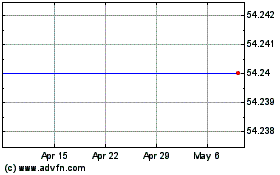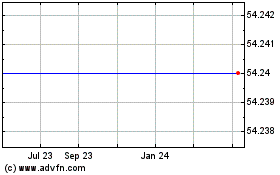A former heir apparent to billionaire investor Warren Buffett
has resurfaced in an unusual role—as an activist agitating for the
sale of a small Virginia bank.
David Sokol, once widely expected to succeed Mr. Buffett as
chief executive of Berkshire Hathaway Inc., has kept a fairly low
profile since leaving the conglomerate amid a stock-trading
controversy five years ago.
In recent weeks, though, Mr. Sokol has aggressively and publicly
pushed Middleburg Financial Corp. to put itself up for sale. The
former Berkshire executive has been invested in the bank for nearly
eight years and holds 30% of its stock. Last week, he wrote the
bank's directors and said he believes Middleburg "has more value as
part of a larger bank" and urged it to explore a sale.
The letter, released in a regulatory filing, also said the board
has "done nothing in hopes that this matter will go away"—adding
that Mr. Sokol has hired lawyers and investment bankers to work
with him on ways to realize the value of his stake, now worth
around $57 million.
In an interview, Mr. Sokol said he believes small and midsize
banks are important to local communities and businesses, but banks
with less than $2 billion in assets can no longer be competitive
given the cost of complying with postcrisis regulations.
"They need to be larger, at least in the $3 to $6 billion size,
to be competitive and be able to distribute the cost of banking on
a broader basis," he said.
Middleburg spokesman Joseph Berg said, "We have appreciated our
long-standing relationship with Mr. Sokol and look forward to
maintaining our constructive dialogue." The bank noted it has
achieved a shareholder return of 108% in the seven years since
March 2009, when Mr. Sokol first disclosed a significant stake.
Over the same period, a KBW index of regional bank stocks rose
128%, according to Thomson Reuters.
In addition to becoming a more-vocal investor, Mr. Sokol, 59
years old, is becoming increasingly vocal about politics. He is an
avowed fan of "Atlas Shrugged," the 1957 novel by Ayn Rand that
made a moral case for capitalism and self interest. In public
speeches and columns, Mr. Sokol has drawn comparisons between the
dystopian, over-regulated America portrayed in the book and the
present day, saying that free enterprise is increasingly under
attack.
A Republican who donated to former Massachusetts Governor Mitt
Romney's 2012 presidential bid and supported Jeb Bush in the
current campaign before the former Florida governor dropped out,
Mr. Sokol hasn't decided who he will vote for.
"Out of 315 million people in this country, if those are the
five best, there's something wrong," he said of the remaining
Republican and Democratic candidates in the presidential race. He
also is bothered by what he says is society's "loss of civility,"
referring in a recent opinion article to insults traded by
presidential candidates while issues of national importance are
ignored. In that article, published in the Washington Times, he
also contended that, given the "incendiary time in American life,"
little was achieved by airing "Confirmation," the recent HBO movie
about the Senate hearings to confirm Clarence Thomas to the Supreme
Court. Mr. Thomas, he wrote, is a personal friend.
Middleburg Financial owns a community bank with 13 branches and
offers other financial services such as asset management and
mortgages. It serves an affluent community not far from Washington
and has assets of $1.3 billion.
Over the years, Mr. Sokol attended Middleburg's annual strategy
meetings and invited some board members to Jackson Hole, Wyo.,
where he lives, for activities that included fly fishing and
rafting. Eventually, he raised the idea of a sale of the bank.
"They have been trying to grow their way out of the problem,"
but that strategy hasn't been working, Mr. Sokol said. The bank's
return on equity of 6.25% in 2015 is below its cost of capital, and
remaining independent isn't going to make the business economical,
he said.
Bank mergers hit a postcrisis high last year and are expected to
continue. Several small and midsize banks have struck deals in
recent months, including National Penn Bancshares Inc., which
BB&T Corp. bought this month for $1.8 billion. In January, the
Michigan banks Chemical Financial Corp. and Talmer Bancorp Inc.
merged in a $1.1 billion deal.
Mr. Sokol's family office, called Teton Capital LLC, holds
stakes in private and public companies in a range of industries.
The Omaha native resigned from Berkshire in 2011 after disclosures
that he had personally bought shares of a chemical company,
Lubrizol, not long before recommending that Mr. Buffett buy it for
Berkshire.
In 2013, Mr. Sokol's lawyer said the Securities and Exchange
Commission had decided not to take action against the former
Berkshire executive. Mr. Sokol said he hasn't spoken to Mr. Buffett
since he parted ways with Berkshire. Not long after Mr. Sokol
resigned, Mr. Buffett publicly said he thought the executive's
behavior with regard to the Lubrizol affair was inexplicable and
inexcusable and violated the company's code of ethics.
"Why he chose to do that I will never understand," Mr. Sokol
said.
Mr. Buffett didn't respond to request for comment.
Write to Serena Ng at serena.ng@wsj.com and Anupreeta Das at
anupreeta.das@wsj.com
(END) Dow Jones Newswires
April 25, 2016 00:15 ET (04:15 GMT)
Copyright (c) 2016 Dow Jones & Company, Inc.
BB and T (NYSE:BBT)
Historical Stock Chart
From Mar 2024 to Apr 2024

BB and T (NYSE:BBT)
Historical Stock Chart
From Apr 2023 to Apr 2024
